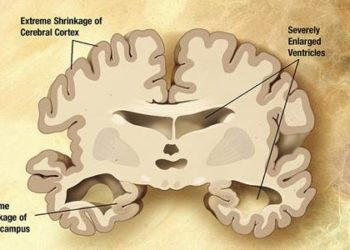Amyloid-PET imaging leads to changes in management in patients with dementia
1. In this prospective cohort study, changes in clinical management occurred after amyloid-PET imaging for a majority of patients with mild cognitive impairment (MCI) or dementia who met appropriate use criteria for imaging.
2. In patients that underwent imaging, the diagnosis changed from Alzheimer’s Disease (AD) to non-AD in a quarter of patients and non-AD to AD in about ten percent.
Evidence Rating Level: 1 (Excellent)
Study Rundown: Though Alzheimer’s Disease (AD) is the most common form of dementia, it is a diagnosis that can only definitively be made post-mortem. Despite this, amyloid-PET imaging has relatively high specificity and sensitivity for detecting AD in living patients, though it is unclear if such imaging would lead to substantial changes in clinical management. In this prospective cohort study of Medicare beneficiaries, changes in clinical management occurred after amyloid-PET imaging for a majority of patients with mild cognitive impairment (MCI) or dementia who met appropriate use criteria for imaging. The diagnosis changed from AD to non-AD in a quarter of patients and non-AD to AD in about ten percent. Significant changes in management occurred for patients with pre-PET diagnosis of MCI or non-AD dementia but not for those with pre-PET diagnoses of AD dementia.
This study demonstrated that amyloid-PET imaging had large effects on disease management, much larger than the minimum threshold set by previous studies of coverage with evidence development. However, patients were included only if appropriateness criteria were met, including a priori acknowledgment that amyloid-PET imaging results were likely to change diagnosis and management. Future studies will be needed to determine if patient outcomes change as a result of amyloid-PET imaging.
Click to read the study, published today in JAMA
Relevant Reading: Clinical Use and Utility of Amyloid Imaging
In-Depth [prospective cohort]: In the Imaging Dementia Evidence for Amyloid Scanning (IDEAS) study, 946 dementia specialists from 595 unique practices across the United States recruited 11,409 Medicare beneficiaries with MCI or dementia to undergo amyloid-PET imaging. Patients were included if >65yo, English or Spanish speaking, had a diagnosis of MCI or dementia within 24 months, had a complete diagnostic assessment (MMSE or MOCA, lab testing within 12 months, head CT or MRI within 24 months), and met the appropriateness criteria for amyloid-PET imaging, including uncertain etiology of cognitive decline after comprehensive workup by dementia specialist, AD as a diagnostic consideration, and a priori acknowledgment that amyloid-PET imaging may change diagnosis or management. Patients were excluded if prior amyloid status was known via PET or CSF analyses or if learning of amyloid status would cause significant psychological harm to the patients in the specialist’s opinion. Any of the three FDA-approved amyloid-PET imaging ligands could be used and scans were interpreted dichotomously as positive or negative. A pre-specified threshold of a 30% change in management was chosen based on previous studies of coverage with evidence development concerning diagnostic imaging. Change in management was defined as change in AD or other drug therapy or changes in counseling about safety and future planning. The post-PET imaging period lasted up to 90 days. Changes in management between pre- and post-PET imaging occurred in 60.2% of cases (CI95 59.1 to 61.4%) with MCI as pre-PET diagnosis and 63.5% (CI95 62.1 to 64.9%) in cases with dementia, leading to a significant change in management overall (p < 0.001, one-sided). Physicians reported post-PET results as a driver in changes to their management plan in 85.2% of instances where management changed. The diagnosis switched from AD to non-AD dementia in 25.1% of cases (CI95 24.3 to 25.9%) and non-AD to AD dementia in 10.5% of cases (CI95 10.0 to 11.1%). There were no associations for age, sex, education, or pre-PET AD drug use and change in management. A significant difference was detected for change in management and pre-PET diagnosis, revealing that a change in management was significant for those with pre-PET diagnoses of MCI or non-AD dementia (Odds Ratio 3.54; CI95 2.96 to 4.23) but not for those with AD dementia diagnoses (OR 1.14; CI95 0.99 to 1.32). Results of amyloid-PET imaging were positive for 63.8% of patients with pre-PET diagnosis of AD and negative for 47.8% of patients with pre-PET diagnosis of non-AD dementia.
Image: PD
©2019 2 Minute Medicine, Inc. All rights reserved. No works may be reproduced without expressed written consent from 2 Minute Medicine, Inc. Inquire about licensing here. No article should be construed as medical advice and is not intended as such by the authors or by 2 Minute Medicine, Inc.







![In utero administration of ivacaftor averts multiorgan disease in ferret model of cystic fibrosis [PreClinical]](https://www.2minutemedicine.com/wp-content/uploads/2019/04/The_fluorescent_microscopy_image_of_CFTR_tagged_with_EYFP-75x75.jpg)

